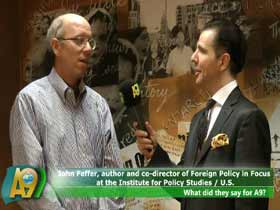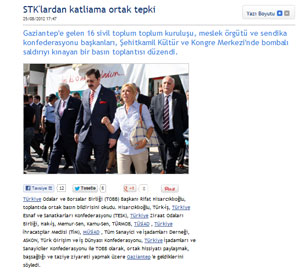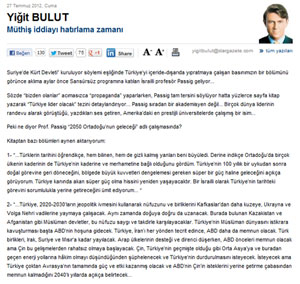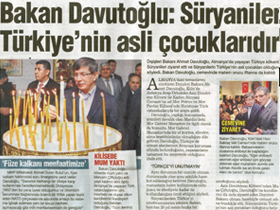Bigotry: The Dark Danger
Back with two old friends: Israel and Turkey
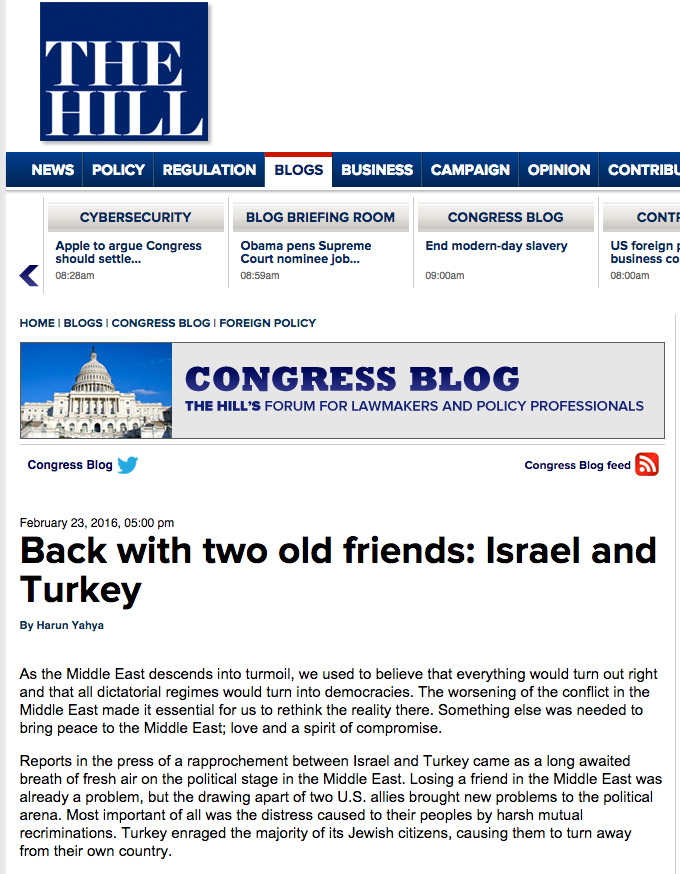
As the Middle East descends into turmoil, we used to believe that everything would turn out right and that all dictatorial regimes would turn into democracies. The worsening of the conflict in the Middle East made it essential for us to rethink the reality there. Something else was needed to bring peace to the Middle East; love and a spirit of compromise.
Reports in the press of a rapprochement between Israel and Turkey came as a long awaited breath of fresh air on the political stage in the Middle East. Losing a friend in the Middle East was already a problem, but the drawing apart of two U.S. allies brought new problems to the political arena. Most important of all was the distress caused to their peoples by harsh mutual recriminations. Turkey enraged the majority of its Jewish citizens, causing them to turn away from their own country.
Meetings aimed at establishing friendship between Turkey and Israel are still continuing in these days. The talks in Geneva in recent weeks allowed progress to be made on important issues. While agreement was reached on the subject of compensation, the issue of lifting the blockade in Gaza was left for later talks. Statements by Israeli Prime Minister Netanyahu to the effect that both sides need to make sacrifices for progress to be made and that “we aspire to normalization with all our neighbors, but it's always a two-way street,” are of course significant. Compromise is certainly a two-way street; so when a certain stage is reached, the two sides have to adopt a friendly and positive approach to one another. Both Turkey and Israel have used all their means to sit down at the table in a genuinely willing manner. The sides are therefore obviously unwilling to damage a fine alliance constructed with such difficulty.
Let us also remind ourselves that in the week when the Swiss talks were taking place, President Erdoğan and Prime Minister Davutoğlu also received a delegation led by Malcolm Hoenlein from the “Conference of Presidents,” an umbrella organization for leading Jewish bodies in the U.S. Hoenlein is also close to Netanyahu and was charged with delivering special messages from Netanyahu to Erdoğan and Davutoğlu. Let us add that in the context of the same meeting, Erdoğan and Davutoğlu also met with leaders of the American Jewish community. The talks were clearly a sign of good intent. With these meetings, the Turkish leaders took important steps to strengthen feelings of trust.
On the subject of lifting the Gaza blockade, that will also benefit Israel. That will lower tensions in Gaza and allow Turkey to resume its former role of intermediary. This is vital, because tensions between the sides have recently been at the very lowest ebb. The presence of a guarantor country such as Turkey is a factor that can prevent such a climate emerging again. Israel’s concerns on this matter are therefore unfounded.
Israeli gas is another important issue in the talks. This subject is of close interest to Israel, which wants to export its gas, and to Turkey, which needs it. However, there is another important benefit to this detail - the Cyprus negotiations. The pipeline due to run through Cyprus will be instrumental in speeding up the Cyprus negotiations that have been stalled for many years. Turkish Foreign Minister Mevlüt Çavuşoğlu, who has said that he wishes the water sent to Northern Cyprus from Turkey also to be sent to the southern part of the island in the near future, has reported that the sides have reached an agreement on numerous issues, but are still facing difficulties on the subject of property and land. The presence of 22 categories of property requiring resolution over the last 40 years has ended in the Cyprus talks becoming intractably complex.
Problems cannot be resolved through calculations of land or self-interest. Looking at the equation before us, there is clearly a need for trust between Israel and Turkey, and between Turkey and Southern Cyprus. The selfish, cold and self-interested system known as ‘national advantage’ merely smothers countries in difficulties. The leaders of these communities, which have been friends for many years and share similar traditions, customs, cultures and conceptions of self-sacrifice and friendship, need to build love between them without delay.
Since love and trust are unfamiliar concepts in politics, they may not seem credible in some people’s eyes. Yet resolving political problems with love rather than selfishness is not a utopian ideal. Love is not an impossible luxury, but our life’s blood that has been forcibly taken from us.
That is why reconciliation between Israel and Turkey is good news we have been longing for. Of course this reconciliation is also very welcome to the U.S.. The recent efforts to bring about this reconciliation on the part of U.S. Vice-President Joe Biden are deserving of high praise. Powerful, democratic countries must always be allies in order to bring peace to the region. Therefore, in being instrumental in establishing a major increase in power and bringing peace to the Middle East, this alliance will eliminate concerns in the U.S. and permit a more concrete and powerful alliance between the U.S. and both countries.
We hope that this welcome reconciliation will lead to unity between the peoples of Israel and Turkey and to the return of those of our Jewish citizens who have had to leave the country.
Adnan Oktar's piece on The Hill:
2016-02-24 17:12:29
